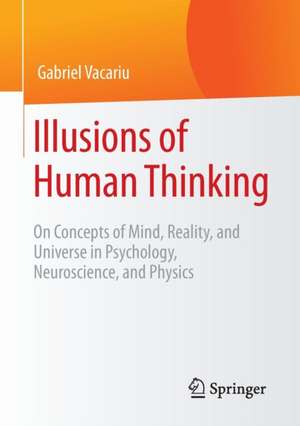Illusions of Human Thinking: On Concepts of Mind, Reality, and Universe in Psychology, Neuroscience, and Physics
Autor Gabriel Vacariuen Limba Engleză Paperback – 29 oct 2015
Preț: 348.39 lei
Nou
Puncte Express: 523
Preț estimativ în valută:
66.67€ • 69.21$ • 55.59£
66.67€ • 69.21$ • 55.59£
Carte tipărită la comandă
Livrare economică 24 martie-07 aprilie
Preluare comenzi: 021 569.72.76
Specificații
ISBN-13: 9783658104436
ISBN-10: 3658104430
Pagini: 196
Ilustrații: VIII, 188 p. 10 illus.
Dimensiuni: 148 x 210 x 15 mm
Greutate: 0.26 kg
Ediția:1st ed. 2016
Editura: Springer Fachmedien Wiesbaden
Colecția Springer
Locul publicării:Wiesbaden, Germany
ISBN-10: 3658104430
Pagini: 196
Ilustrații: VIII, 188 p. 10 illus.
Dimensiuni: 148 x 210 x 15 mm
Greutate: 0.26 kg
Ediția:1st ed. 2016
Editura: Springer Fachmedien Wiesbaden
Colecția Springer
Locul publicării:Wiesbaden, Germany
Public țintă
Popular/generalCuprins
Epistemological Different Worlds (EDWs).- Existence and Interactions.- Brain/Body, Self/Mind.- EDW's and Philosophy of Mind (Descartes, Kant).- Cognitive (Neuro)Science.- Neuroscience Biology.- Physics (Quantum Physics, Einstein's Theory of Relativity).
Notă biografică
Gabriel Vacariu is Professor at the Department of Philosophy at University of Bucharest. Lectures and seminars on Philosophy of Mind and Cognitive Science, Introduction to Cognitive Neuroscience, Epistemology and the Philosophy of Science.
Textul de pe ultima copertă
The book illustrates that the traditional philosophical concept of the „Universe”, the „World” has led to anomalies and paradoxes in the realm of knowledge. The author replaces this notion by the EDWs perspective, i.e. a new axiomatic hyperontological framework of „Epistemologically Different Worlds” (EDWs). Thus it becomes possible to find a more appropriate approach to different branches of science, such as cognitive neuroscience, physics, biology and the philosophy of mind. The consequences are a better understanding of the mind-body problem, quantum physics non-locality or entanglement, the measurement problem, Einstein’s theory of relativity and the binding problem in cognitive neuroscience.
Contents
• Epistemological Different Worlds (EDWs)
• Existence and Interactions
• Brain/Body, Self/Mind
• EDWs and Philosophy of Mind (Descartes, Kant)
• Cognitive
(Neuro)Science • Neuroscience Biology
• Physics (Quantum Physics, Einstein’s Theory of Relativity)
Target Groups
• Students and scholars of psychology, biology, physics and neuroscientific
studies
• Students and lecturers of philosophy, in particular theory of knowledge
and science, philosophy of mind
• Interdisciplinary audience interested in basic questions of modern
Particular Sciences
The Author
Gabriel Vacariu is Professor at the Department of Philosophy at University
of Bucharest. Lectures and seminars on Philosophy of Mind and Cognitive
Science, Introduction to Cognitive Neuroscience, Epistemology, and
the Philosophy of Science.
Contents
• Epistemological Different Worlds (EDWs)
• Existence and Interactions
• Brain/Body, Self/Mind
• EDWs and Philosophy of Mind (Descartes, Kant)
• Cognitive
(Neuro)Science • Neuroscience Biology
• Physics (Quantum Physics, Einstein’s Theory of Relativity)
Target Groups
• Students and scholars of psychology, biology, physics and neuroscientific
studies
• Students and lecturers of philosophy, in particular theory of knowledge
and science, philosophy of mind
• Interdisciplinary audience interested in basic questions of modern
Particular Sciences
The Author
Gabriel Vacariu is Professor at the Department of Philosophy at University
of Bucharest. Lectures and seminars on Philosophy of Mind and Cognitive
Science, Introduction to Cognitive Neuroscience, Epistemology, and
the Philosophy of Science.
Caracteristici
The Book delivers a new axiomatic-hyperontological framework for a non-contradictory conceptual understanding of "Welt" ("Universe") Shows how to solve fundamental and philosophical problems of Science ("Pseudoproblems") Gives deep insight into philosophical discussions of Philosophy of Mind, Neurosciences, Psychology, Theory of Relativity, Quantum Mechanics Includes supplementary material: sn.pub/extras

















